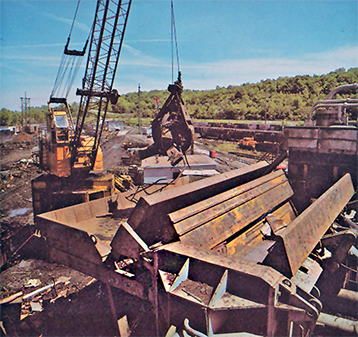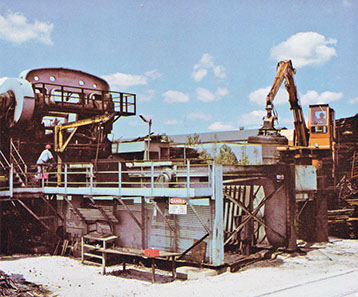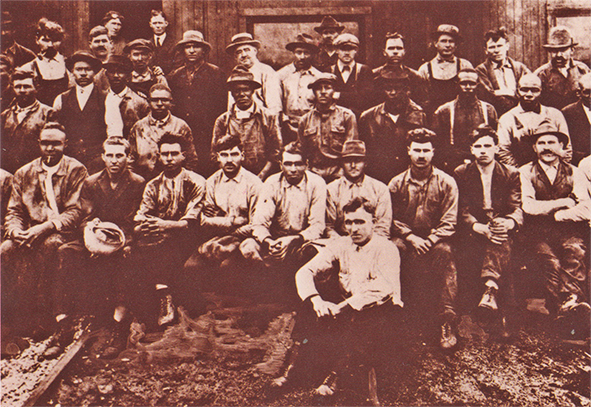
The History
of ERMAN Corporation


In the early 1920’s Chicago was stretching and growing at a tremendous rate. Sky scrappers were establishing the city’ skyline: ships and rails were marking the city as a hub of commerce, and the late Walter Erman founded the cornerstone of what is now known as Erman-Howell. In those years the need for the raw materials of growth were no different than today — men, ideas and steel.
Out of those concepts, Walter Erman built a small yard for the processing of scrap metal. Located on Chicago’s south side, the runner of what was later to be the Anthony Contracting Company began recycling the tons of metal cast off in the careless years of growth.
In 1925, Walter Erman formed a brokerage partnership with Edward Howell. Later that year, Erman-Howell and Company, Inc. moved into offices at 332 South Michigan. It was almost 50 years later that Erman-Howell moved to its present location at 125 South Wacker Drive. During those 50 years, the Company developed its area of expertise in the recycling and processing of ferrous and non-ferrous metals needed by industry.
Above some of the staff of Erman-Howell Corporation (circa 1925)
In 1925 the railroad cars containing scrap were unloaded by hand and the scrap was cut into pieces with hammer and chisel, sorted and reloaded with backbreaking effort. In subsequent years the Anthony Contracting Company founded newer and more efficient methods of processing the tons of scrap necessary to meet the demand, using hydraulics, electromagnets and high-temperature torches.
By the mid-1940’s Erman-Howell and Company had developed into a burgeoning brokerage business. When Ed Howell passed away, Walter Erman sold the entire firm including the Anthony Contracting Company processing yard, to Luria Steel and Trading Corporation.
It was in 1958 when Walter Erman revitalized his old firm – Walter Erman & Company in Lemont, Illinois. There he processes material for Ceco Steel. In 1960, Walter Erman & Company started another new business – Erman Corporation, Inc., at Kansas City, Kansas. This facility grew to be the world’s largest processing yard for condemned railcars. The 40-acre plant has 15 miles of railroad track and the largest railroad car incinerator in the country.
In the Kansas City facility over 600 railroad cars are dismantled per-month through a1335A and a 1123 Harris shear. Before shearing these cars a processed through the incinerator and then undergo preliminary cutting using hand torches. The cars are then fed to the shears using two AmHoist 80 boom pedestal cranes. The balance of the yard operations are serviced by four AmHoist locomotive cranes and two switch engines Those rail cars which are capable of additional use are reconditioned in the yard’s rebuilding shop. Those mounted wheels that are identified as scrap are processed through a fully automated double-action wheel press. As a by-product of the aforementioned, the yard has available large quantities of second-hand railroad car parts for reuse by the railroad industry.
In 1972, Walter Erman passed away and Walter Roth, a graduate of Northwestern University, who had worked his way up from a part time employee to President of Erman-Howell, purchased the Walter Erman & Company (Lemont, Illinois) plant and Erman Corporation from the estate of Walter Erman.
In 1973, Michael Strauss was named Vice President of Erman-Howell Division Luria Steel & Trading Corporation, as well as Vice President of Walter Erman & Company.
In 1975 the company’s home office moved from facilities which were occupied for fifty years at 332 South Michigan Avenue in Chicago to a much larger and completely modern facilities on the 18th floor of a newly erected building at 125 South Wacker Drive.
Today the ERMAN Corporation torch continues to burn bright as the Roth family runs the company. At the helm are brothers Ted and Rob Roth who manage operations at the expanded Kansas City processing facility as well as the company headquarters now located in Lake Bluff Illinois. The Kansas City processing facility has expanded to over 100 acres and is one of the largest recyclers of retired railcars and locomotives in the United States.



